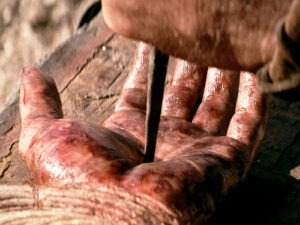 This reflection is based on John 6:51-58 for the Solemnity of the Most Precious Body and Blood of Christ.
This reflection is based on John 6:51-58 for the Solemnity of the Most Precious Body and Blood of Christ.
My first thought whenever I hear of the Solemnity of the Corpus Christi is the Mass bread and wine. And why not? We Catholics believe that at the Consecration, the bread and wine are transformed not just into a symbol of Christ’s presence, but to His actual body and blood. You may not understand it, or you may even choose not to believe it, but it’s not a shocking idea at all.So it’s kind of strange when I hear that our Lord’s listeners in the Gospel express shock and disbelief when the Lord tells them precisely that. “How can this man give us his flesh to eat?” they protest to one another.
“What’s the big deal?” I catch myself thinking until I realize that of course they were right to be disturbed and shocked. It is a big deal, not to mention, a little crazy, that this man would tell us to “eat his flesh and drink his blood.” If we want eternal life, we have to–to use His words–“feed on Him.”
Today’s Solemnity of the Lord’s Body and Blood reminds us how much more seriously our Lord takes something that we have somehow taken so much for granted: what it means to “take flesh,” to “wear skin.” Sometimes, especially when our bodies fail us, we can’t help but wish them away. That was not the case with the Lord. When He rose from the dead, He could have discarded your old broken body, but didn’t. Instead He chose to keep it, complete with all its wounds, so much so that today, in His glory, He continues to wear our skin.
I think one message we can get from today’s feast is Jesus’ nearness. Because He has body like ours, He knows what it means to have the sun on His face, to feel sweat on His skin. Like us, He knows the pleasures we know: to feast on good food and good wine, to accept the touch of a mother, to receive encouragement through a good friend’s tap on the shoulder. He also knows the pains we know: the limits to one’s strength, the waning of energy, tears blurring our vision, and the sting of freshly inflicted wounds.
So whether in pleasure or pain, in health or sickness, the Lord Jesus is near because He has “been there, done that.” And still not content with that, He didn’t depart without leaving behind His body and blood with us in the Eucharist. Our faith insists that appearances to the contrary notwithstanding, every plain-looking wafer and every cup of that overly sweet wine raised in consecration at Mass are literally transformed into His very body and blood. What can be more intimate than to be fed His body and blood?
When I think about it, Christianity isn’t a very spiritual religion. As the Jesuit activist/poet, Daniel Berrigan, wrote somewhere about being Christian: “It all comes down to this: Whose flesh are you touching and why? Whose flesh are you recoiling from and why? Whose flesh are you burning and why?” There’s no going around flesh if we’re serious about following the Lord.
Dearest Jesus, thank you for insisting on wearing our skin for all of eternity. Forgive us for taking for granted your physical presence in us and among us. Grant us the eyes to recognize you not only in the Eucharistic host and wine, but also in our own bodies, especially the broken bodies of our brothers and sisters.
4 replies on “BODY AND BLOOD”
thank you Fr. J.
Beautiful reflection. Oh Jesus, thank you for the gift of you. the whole of you. Continue your patience with me as I try to imitate you.
Thank you Fr J for this reflection and for starting this weekly email blast. We are the Filipino choir at St Ignatius Church in Singapore and we appreciate this series and share them with our community.
thank you… Paused to reflect how much more comfortable we are when we think of Christ’s body and blood as bread and wine on the altar. There we can venerate and pretend to ourselves that we love and adore the Lord. So much more difficult to love and venerate Christ in the FLESH: the Triune God who is in each of us, in the person across from us, or the person we disdain for one reason or another. The feast of the Corpus Christi is another chance to resolve to look for Him: “Grant us the eyes to recognize you not only in the Eucharistic host and wine, but also in our own bodies, especially the broken bodies of our brothers and sisters.”